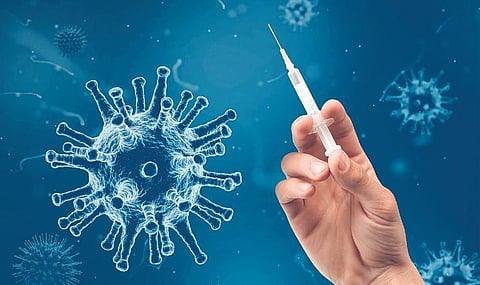

BENGALURU: India could soon have a new vaccine for the mutating COVID-19 virus to keep the virus at bay. Scientists at the Indian Institute of Science (IISc) have been working on developing a heat-tolerant vaccine that can offer protection against different strains of SARS-CoV-2 which includes both current and future variants. The team has completed pre-clinical trials and is gearing up for the human testing of the vaccine candidate.
According to scientists the evolving nature of the virus and different mutations, they are not sure if the current vaccines can be helpful. Raghavan Varadarajan, Professor at the Molecular Biophysics Unit (MBU) has been leading this research project in collaboration with Mynvax, a startup since the beginning of the pandemic.
After analysing various proteins found in the virus, researchers selected two parts of SARS-CoV-2’s spike protein – the S2 subunit and the Receptor Binding Domain (RBD) – for the new vaccine. The S2 subunit is highly conserved – it mutates much less than the S1 subunit, which is the target of most current vaccines. Scientists have also known that the RBD can provoke a strong immune response in the host. The team created a hybrid protein called RS2 by combining these two components, read a statement released by IISc.
The researchers used mammalian cell lines to study the expression of the hybrid protein. “The protein showed very high levels of expression, and initially I thought that the experiment was not working properly,” said Nidhi Mittal, PhD student at MBU and first author of the study. Further research by Mittal showed that this protein potentially be produced in large quantities.
The team then tested the effects of the protein in both mice and hamster models. They found that the hybrid protein triggered a strong immune response and provided better protection when compared to vaccines containing the whole spike protein.
Varadarajan told TNIE that RS2 has better coverage compared to other vaccines. This could be India’s first homegrown vaccine for the JB.1 variant and others as Covaxin developed for the mutation has become inactive. “Post clinical trials the vaccine can be administered to everyone, starting with healthy human bodies. So far in our animal testing we have not seen any side effects but will have to wait for results on humans,” added Varadarajan.
The RS2 antigen can also be stored at room temperature for a month without the need for cold storage, unlike many vaccines in the market which require mandatory cold storage. This would make the distribution and storage of these vaccine candidates much more economical.
Varadarajan said the vaccine candidate can be tailored to incorporate the RBD region of any new variant of SARS-CoV-2 that might emerge. Its high levels of expression and stability at room temperature can greatly reduce production and distribution costs, making it well-suited for combating COVID-19. “If need be, the vaccine can also be updated as and when the mutation develops over the years,” he added.